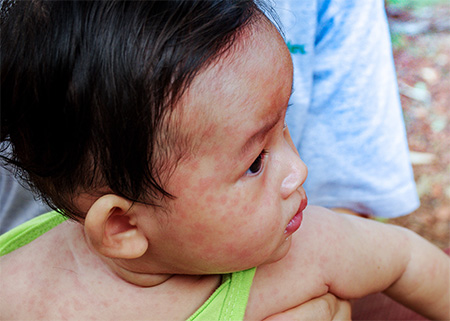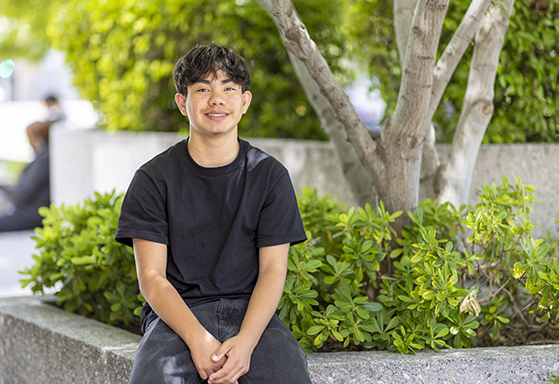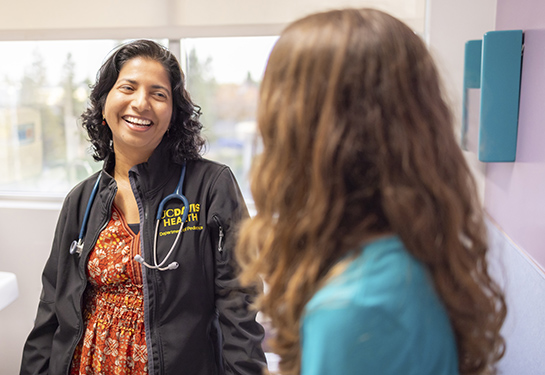Measles outbreaks: symptoms, treatment and prevention: What parents need to know
Pediatrician Dean Blumberg shares how to keep kids safe as measles spreads in the U.S.
With measles outbreaks occurring now through the U.S., UC Davis Health experts advise parents to be aware of the symptoms and call a health care provider if they suspect that their child has measles. Dean Blumberg, chief of pediatric infectious diseases at UC Davis Children’s Hospital, also answers some frequently asked questions about measles.
What are the symptoms of measles?

Symptoms usually begin 10-14 days after exposure to the virus. Measles starts with a fever, which can be very high. Cough, runny nose and red eyes are common. One of the most distinctive features of measles is a red, spotty rash that starts at the head and then spreads downward over the rest of the body. Complications can include diarrhea, dehydration, ear infections, pneumonia, blindness, inflammation of the brain, and death.
How does measles spread?
Measles is highly contagious. The virus particles are very small and can be suspended in the air up to two hours. So, a person with measles who enters and then leaves a room can infect others who enter that same room for up to two hours, without direct person-to-person contact. Measles can also live on infected surfaces for up to two hours. If one person has measles, up to 90% of the people close to that person who are not immune will also become infected.
How does measles affect those who are pregnant?
If measles occurs during pregnancy, there is an increased risk of intrauterine fetal death, spontaneous abortion and maternal death.
How deadly is measles?
Out of every 1,000 cases, about one to two people, die from measles. Before widespread measles vaccinations in the U.S., 500 children died from measles every year. The World Health Organization reported 107,500 deaths globally from measles in 2023, mostly among unvaccinated or undervaccinated children under the age of 5.
What is the MMR vaccine?
The MMR vaccine protects children from measles, mumps and rubella (also known as German measles) by exposing them to live, weakened forms of the viruses that cause these diseases. Most children do not experience any side effects from the shot. Side effects that do occur are usually very mild and include low-grade fever, transient rash and mild, temporary soreness or swelling where the shot was given.
When should children get their measles vaccinations?
The first dose of the measles vaccination is typically given between 12 and 15 months of age. The second dose is routinely given between 4 and 6 years of age. The first dose protects children 95 to 97 percent of the time. The second dose increases a child’s protection from measles to about 99 percent. By the time children enter school, they should have the two doses. It is especially important to make sure that anyone planning international travel is fully vaccinated since there are measles outbreaks in countries to which Americans often travel.
Does the measles vaccine offer lifetime immunity?
The majority of adults are immune because they typically either had measles as children or received a measles vaccination. I encourage adults to talk with their health care providers about getting the MMR vaccine if they are unsure of their immunity status. There is no danger in getting the vaccine, even if you’ve already had the measles or the vaccine.
If my children are not vaccinated and potentially exposed to measles, should they get the vaccine?
It is a good idea to vaccinate previously unvaccinated children who are potentially exposed to measles. It doesn't guarantee that they won’t get the disease, however it can lessen the severity if they do.
Does the MMR vaccine cause autism?
There were a lot of concerns about this because of a now discredited publication. Since then, many scientific studies in the U.S. and other countries involving millions of children have reached the same conclusion: The MMR vaccine does not cause autism.
How do you treat measles?
There is no specific antiviral treatment for measles. Treatment is generally supportive such as IV fluids if patients are dehydrated, or respiratory support such as supplemental oxygen if they are having difficulty breathing. Children with measles should stay home from school and activities, rest and drink plenty of liquids to avoid dehydration.
What should I do if I think my child has been exposed?
If you suspect your child may have measles, contact your health care provider in advance and ask if your child can be seen in an isolation room.



